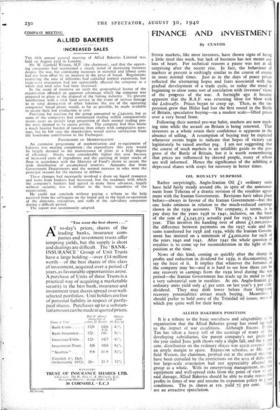FINANCE AND iNVESTMEN
By CUSTOS STOCK markets, like most investors, have shown signs of being a little tired this week, but lack of business has not meant any loss of heart. For technical reasons a pause was not at all surprising after the recent rise. In fact, the behaviour of markets at present is strikingly similar to the course of events in more normal times. Just as in the days of peace prices reflected the alternating hopes and fears associated with the gradual development of a trade cycle, so today the trend is beginning to show some sort of correlation with investors' views of the progress of the war. A fortnight ago it became apparent that the R.A.F. was returning blow for blow with the Luf twaffe. Prices began to creep up. Then, as the im- pression grew that Hitler had lost the first round in the Battle of Britain, speculative buying—on a modest scale—lifted prices over a very broad front.
Following their normal pre-war habit, markets are now mark- ing time while the assault on Britain is being renewed. That investors as a whole retain their confidence is apparent in the absence of selling. A resumption of buying may be expected whenever events begin to indicate that hopes of victory can legitimately be raised another peg. I am not suggesting that the course of stock markets is an infallible guide to the pro- gress of the Battle of Britain, but it is worth remembering that prices are influenced by shrewd people, many of whom are well informed. Hence the significance of the nibbling at depressed shares with scope for recovery in better times.
OIL ROYALTY SURPRISE
Rather surprisingly, Anglo-Iranian Oil Li ordinary units have held fairly steady around 26s. in spite of the announce- ment from Teheran of a drastic revision of the royalties agree- ment with the Iranian Government. Revisions have taken place before—always in favour of the Iranian Government—but this one looks ominous in relation to the much-reduced earnings shown in the 1939 accounts. The company, it seems, is to pay duty for the years 1938 to 1941, inclusive, on the basis of the sum of £3,545,313 actually paid for 1937, a bumper year. This involves the handing over of about L000,000— the difference between payments on the 1937 scale and the sums transferred for 1938 and 1939, while the Iranian Govern- ment has insisted on a minimum of £4,000,000 for each of the years 1940 and 1941. After 1941 the whole question of royalties is to come up for reconsideration in the light of the position at the time.
News of this kind, coming so quickly after the slump in profits and reduction in dividend for 1939, is disconcerting, to say the least of it. It implies that whatever the fortunes of the company may be—and it is hard to see how there can be any recovery in earnings from the 1939 level during the war period—the Iranian Government has made up its mind to take a very substantial sum in royalties. At 26s. Anglo-Iranian Li ordinary units yield only 41.- per cent. on last year's 5 per cent. dividend. They may drift lower before their long-term recovery potentialities attract much buying. Meantirm, should prefer to hold some of the Trinidad oil issues, most of which pay quite well for their keep.
ALLIED BAKERIES POSITION
It is a tribute to the basic soundness and adaptability of in organisation that the Allied Bakeries group has stood up well to the impact of war conditions. Although Excess Profits Tax has taken a heavy toll of the earnings of many of the developing subsidiaries, the parent company's net profit for the year ended June 3oth shows only a slight fall, and the I= per cent. distribution on the ordinary shares was again covered %-ith an ample margin to spare. Expansion schemes, as Mr. !ar- field Weston, the chairman, pointed out at the annual rneeling, have been curtailed by the restrictions on the area of delis% ries, but large-scale evacuation had not appreciably affected the group as a whole. With its enterprising management, inc.le.ra equipment and well-spread risks from the point of view of air- raid damage, Allied Bakeries should be able to make reasonable profits in times of war and resume its expansion policy in Face conditions. The 5s. shares at ros. yield 74 per cent. hey are an attractive speculation.


























 Previous page
Previous page